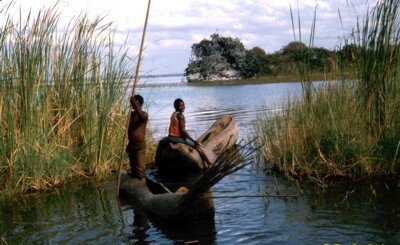
The United States Agency for International Development (USAID) has disclosed that hunger is leading to extinction of fish in Lake Chiuta in Machinga district as residents are now cultivating dried up land.
Lake Chiuta is a shallow lake on the border between Malawi and Mozambique. It lies to the north of Lake Chilwa and to the south of Lake Amaramba, which has no outlet, and the lakes are separated by a sandy ridge. Both lakes lie in a graben which runs northeast-southwest, east of the main African Rift Valley.
According to USAID, the development has posed a risk to fisheries biodiversity as fishers and farmers have converted lakeshore vegetation areas and dry lake beds into gardens where they are growing crops such as maize and vegetables using water from the lake for irrigation and residual moisture.

In a statement, USAID disclosed that the practice is destroying critical fish breeding and nursery habitats which could delay the recovery of fisheries when the lake’s water levels return to normal.
“Since the fishing communities are deemed to be well-off than farmers they do not generally receive food aid. As a consequence, they are resorting to illegal fishing to earn income that they can use to buy food.”
“Unfortunately, the fish catches have also dwindled and this has affected their income. Consequently, the fishers are bearing the brunt of both a failed fishery due to the lake recession, the drought and a policy that does not provide them a food safety net during famine,” reads part of the statement made available to Malawi24.
USAID has since urged government to provide irrigation pumps to farmers to curb growing of crops along biodiversity sensitive areas.
Lake Chiuta’s pan-shaped basin lies on the eastern side of the Mlomba Upland area.
Drainage from the basin flows directly into the lake through a series of affluent streams, controlling both lake level and volume.















very bad
Mind U that the plants besides the water reduces the evaporation rate. 2, if people are cultivating besides the water definately some soil will throw into water reducing the level ofwater. 3, since the tiled garden will be exposed to the sun and will b sucking water, the evaporation rate will b at a high rate
Mind U that the plants besides the water reduces the evaporation rate. 2, if people are cultivating besides the water definately some soil will throw into water reducing the level ofwater. 3, since the tiled garden will be exposed to the sun and will b sucking water, the evaporation rate will b at a high rate
It is indeed true that fish in La
Ur mind is working how can u say that hunger is occuring in malawi due to extinction of lake chiuta though u’r misusing budget money in country when malawian leader will help our country sustainably
Mukalimbana ndi asozi musova
Osamalimbana Ndi Othandza Amalawi ! 4 How Long Do We Intend 2 Do This Rather Than Going Higher
Kukhalira manja mmalo mwa matako
Do we have to wait for some international org. to come tell us what’s happening to us…so we are that damp huh?
Eish!!!
Since laziness is @ high rate then no change can happen in Malawi even if she can receive many donations remember truth hate enanu mukwiya with my idea but Is the only reason why malawians suffer
much as your ideas r making sense to only few individuals stayng in maching, u should also keep in mind that the area z along shire river whch has been costantly posing harsh weather to the area closer to it such that even farmers are tryng their best to mantain food security, there has bn always cut off rainfall-wth tht u already knw that we malawians fully depend rain for most agriculture activities hence that unceasingly hunger. if ppl are to use morden irrigation farmng, there z stil a challenge for low food production- thnk hw many wl hav access to cultivate along that river? ts nt that pple are lazy there
haha…logically, it’s not the hunger that is leading to extinction of fish……it’s coz of the lake drying up as a result of poor rainfall due to the el nino…lol
maybe xambia can help